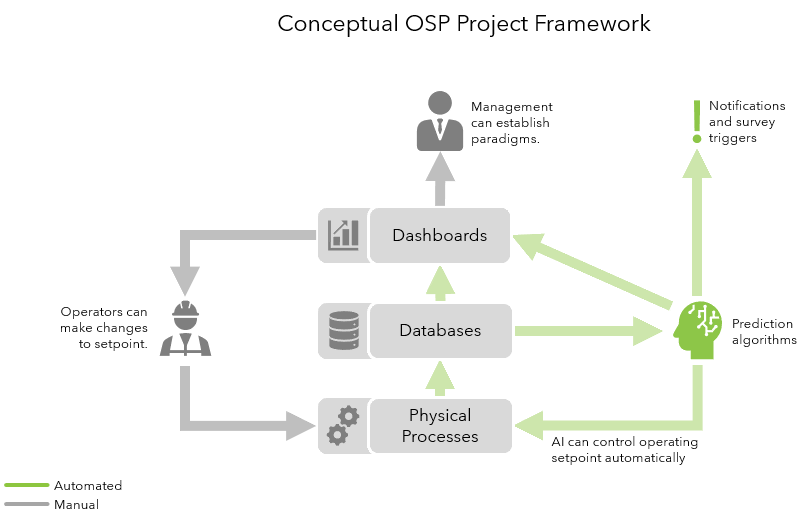
Project framework for artificial intelligence data collection. (SFPUC image)
It was once an industry that relied on a person to physically walk a wastewater treatment plant to take down measurements from several pieces of machinery. Now at the SFPUC’s Wastewater Division, a team of engineers is deploying technological advances at a wastewater treatment plant to improve the accuracy of checks and balances and to make sure resource recovery is a top priority.
“We are treating wastewater to protect public health and the environment. As importantly, we are starting to recover what we treat and turn it into a resource. The main resources from wastewater treatment are recycled water that can be reused for irrigation, energy that can be used to power our facilities, and nutrients that can be used to fertilize farmlands.”

Alex Miot at the Oceanside Treatment Plant.
Alex Miot, a process engineer for the SFPUC, and his team are developing the use of artificial intelligence (AI) at the Oceanside Wastewater Treatment Plant, one of three agency facilities that treats wastewater in San Francisco, to monitor various processes 24/7, 365 days a year. He also says plant operators will see the immediate benefits through a new dashboard that will allow them to make quicker decisions to optimize the treatment process.
“In using artificial intelligence (AI), we will be able to successfully predict system behavior, which can then be used to guide the operators in adjusting processes when prediction shows a drift in the wrong direction. You are given notice to act before an issue occurs,” explains Miot.
In recent years, the regulatory requirements for discharging treated wastewater have become more stringent, according to Miot, and he doesn’t expect them to slow down any time soon. He and his team have been researching and putting into place advanced data analytics and AI tools to address these new regulatory needs. While these are tools aimed at assisting the wastewater operators in analyzing the millions of data, Miot explains optimizing the treatment process will lead to more resource recovery.

From left to right top: Nathan Strong (machine learning), Shreepad Ranadive (IT- Business Intelligence) From left to right bottom: Alexandre Miot (wastewater process), Max Chung (control systems)
“This is just the beginning of technological advances in the wastewater industry. Advanced data analytics and machine-learning will become an integral part of advancing business practices, from wastewater collection to treatment,” exclaimed Miot.
With the new AI-driven dashboard in place, operators will be able to tell how the system is currently performing, how it is likely to perform in the coming hours, and how much resource is being used or recovered while identifying anomalies or changes in behavior that should be addressed right away. Miot compares the AI technology to what’s used in self-driving cars.
“It not only uses a ton of information in real time, but can also extract patterns from that data, so when you are driving, and a pedestrian steps in front of your car, the car recognizes the pedestrian and stops quickly. We are talking data generated and complex patterns recognized in a fraction of a second.”
AI technology has been in development for over a year at the Oceanside Treatment Plant, and Miot says in about a year, he hopes to have more data on the time and money savings that this technology brings. In the meantime, the AI technology is already showing to be a critical tool. Instead of spending a lot of time gathering data, the data from different databases is automatically delivered to a central place.
“Early on when I was presenting to plant operators on this topic, colleagues asked me if this technology would replace their jobs. That is not the case. Computers – and AI – can only do what they are programmed to do; they lack the intuition our operators have. We are just providing them with a better set of tools.”
From identifying patterns in data that they couldn’t see before to a one-stop dashboard, Miot describes artificial intelligence as a game changer that will make wastewater treatment even more precise.
“We will continue to optimize the AI systems, which act like the brain. If you train the computer program on how to behave, it will continue to improve as time goes on. The output will only get better.”
Originally posted SFPUC Newsroom.